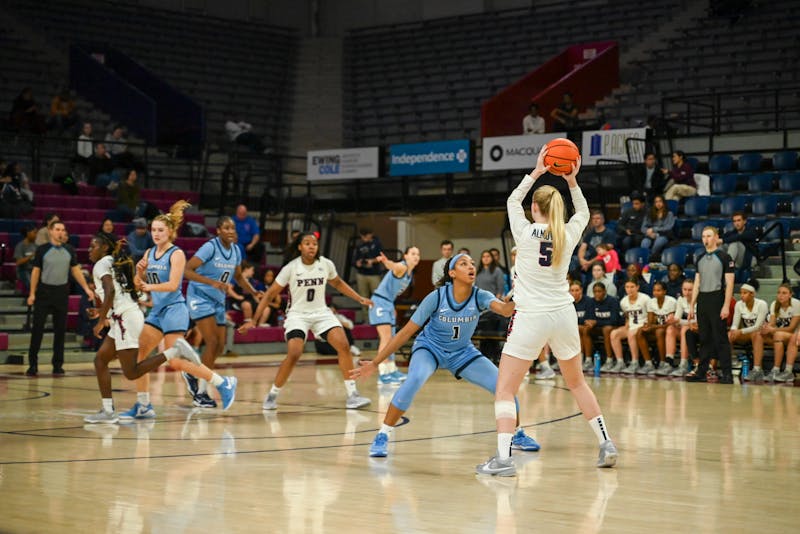
A total of 56 Penn professors signed an open letter condemning funding cuts and federal investigations into American universities.
The faculty members are among nearly 2,000 signatories, all of whom are academic researchers and elected members of the National Academies of Sciences, Engineering, and Medicine. The March 31 letter called for 1968 Wharton graduate and President Donald Trump's administration to end its “wholesale assault” on science and asked the public to “join this call,” urging the American people to understand that the United States’ “scientific enterprise is being decimated.”
The letter comes after higher education institutions across the country — including Penn — have been targeted with funding cuts by the Trump administration. A March 19 order suspended $175 million in grants from Penn, citing the University's failure to bar transgender athletes from women's sports.
Professor of Nursing and Sociology and Dean Emerita of the School of Nursing Afaf Meleis spoke to The Daily Pennsylvanian about her motivations for signing the letter. She articulated her concern as a previous Penn administrator, a healthcare professional, and “a mentor for the future of young scientists.”
“We are protesting because there should be independent scientific inquiry, rather than political inquiry in what people are studying,” Meleis said. “I don’t like silencing or antagonizing scientists because of ideological issues.”
Emeritus Professor of Epidemiology in Biostatistics and Epidemiology at the Perelman School of Medicine Shiriki Kumanyika told the DP that she was “very much willing to endorse the entire letter.”
“Just like people say, ‘stop taking people’s jobs away,’ well, stop taking our science away,” Kumanyika said.
Biology professor and Undergraduate Chair Scott Poethig said he did not find the letter controversial at all, noting that its main message was to “stop screwing around with science.”
The letter came together after an initial group of “13 or so people” drafted it — according to Management & Technology and Computer and Information Science professor Michael Kearns — and reached out to fellow Academy members with whom they had previous contact with. The authors asked their colleagues to consider signing the letter and share it with others. While the researchers are connected through their involvement in the Academy, the decision to sign the letter was a personal one.
“The views expressed here are our own and not those of the National Academies or our home institutions,” the letter reads.
Kearns told the DP that his concern revolved around the federal government’s historic support for science and technology. He said that he doubts — “entirely understandably” — that most Americans “really understand the extent to which science and technology research in this country have been supported by the federal government since World War Two.”
Other faculty signatories expressed similar concerns, not just for the temporary impact of Trump’s actions on Penn, but their impacts on academia and education in the long-term.
“Thousands of scientists have been fired because of the stop work, because of the lack of funding, and there is a pressure to shape the nature of discovery and the nature of science, rather than leaving that for scientists themselves to decide what science needs to be advanced,” Meleis told the DP.
“The administration is influencing the ideology of science toward a way that is harmful to health and equality in public health in the United States,” Law and Sociology professor Dorothy Roberts said to the DP.
The signatories also emphasized their concerns for graduate programs and future of academia.
Professor of Medicine, Epidemiology, and Medical Ethics and Health Policy Scott Halpern said that the administration is waging an “all out war” on science as well as higher education.
“These changes are immediately choking off the supply of the next generation of doctoral students in science, technology, and medicine in this country,” Kearns said. “I think that's a terrible thing that we will be paying a big price for in not too long.”
Halpern also expressed worry over the possibility that graduate students and postdoctoral fellows may “not have the same opportunities for employment.”
Poethig echoed a similar anxiety, and said that his lab wouldn't be able to hire work study students without a grant.
“I can't take on independent study students because I have no money to pay for the equipment or the supplies that they need to use,” Poethig said. “So the knock on effects are not just for what science does, but it's also who science employs, and educational benefits that faculty provide.”
Kumanyika said that it was “remarkable” to her that “people don’t understand the importance of health research.”
Multiple faculty members told the DP that the letter was not a political statement. Halpern characterized the letter as “decidedly nonpartisan.”
Mathematics professor Robin Pemantle said that he did not see the letter as “particularly partisan,” saying that “it speaks in a reasoned voice.”
“It's talking about science, not politics, and I think it’s reasonable extrapolation that American science might suffer greatly and exactly along these lines,” Pemantle added.
Biochemistry and Biophysics professor Gideon Dreyfuss agreed and said that signing the letter was not a political act. He added that “major cuts” are “harmful and very likely detrimental to a vital pillar of our society, a key driver of advances in medicine and technology and the economy, and America’s standing in the world.”
The faculty members also expressed their concerns about the negative ramifications recent federal actions could have on the future of education and science — and the nation as a whole.
“Trump wants to make America great again,” Poethig said. “Why would you take the one thing … that is already undeniably great … and cut it off at the knees?”
Kumanyika explained that changes to higher education have an impact on lower education because the material taught in “elementary school or junior high school science class” is from the knowledge acquired in these institutions.
“I think it's disastrous because it could ruin and break down a whole system of knowledge generation and dissemination that has existed for decades,” Kumanyika said.
Kearns added that even if the federal actions were “reversed,” the changes would have a “real impact at universities, and I think really, for the economy of the United States going forward.”
University Professor Emeritus Jonathan Moreno also shared concern about effects on American standing in the world, saying that the country stands “to risk our leadership in the world in so many ways: health, wealth, national security.”
“Even if this is a short term delay or reduction in financing, science is an enormously competitive field. You've now lost your animals, lost your plants, it's going to take you years to recover, while your competitors in other countries are happily making progress,” Poethig said. “The consequences of this are just immense.”
Professors expressed hope that the letter would influence representatives to take action against the Trump administration’s efforts against scientific endeavors.
Halpern said he hopes the letter can become a priority for “influential congressional representatives and senators who unambiguously have the authority to end the assault on science.”
Other professors said they hope that Penn will change the way it responds to actions from the Trump administration.
“I think Penn should do all it can to resist the weakening of scientific research at the university,” Roberts said. “Rely on other sources of funding, including its endowment, and seek donations from others who are interested in supporting our research enterprise.”
Poethig hoped that the letter would inspire younger people to take collective action against the Trump administration's policies. He added that “until young people get annoyed enough to demonstrate to fight back, it's going to be a hard slog.”
“At some point, I kind of said to myself, what's the point of being in the National Academy of Sciences if you won’t speak up at a time like this?” Kearns said.
The Daily Pennsylvanian is an independent, student-run newspaper. Please consider making a donation to support the coverage that shapes the University. Your generosity ensures a future of strong journalism at Penn.
Donate










